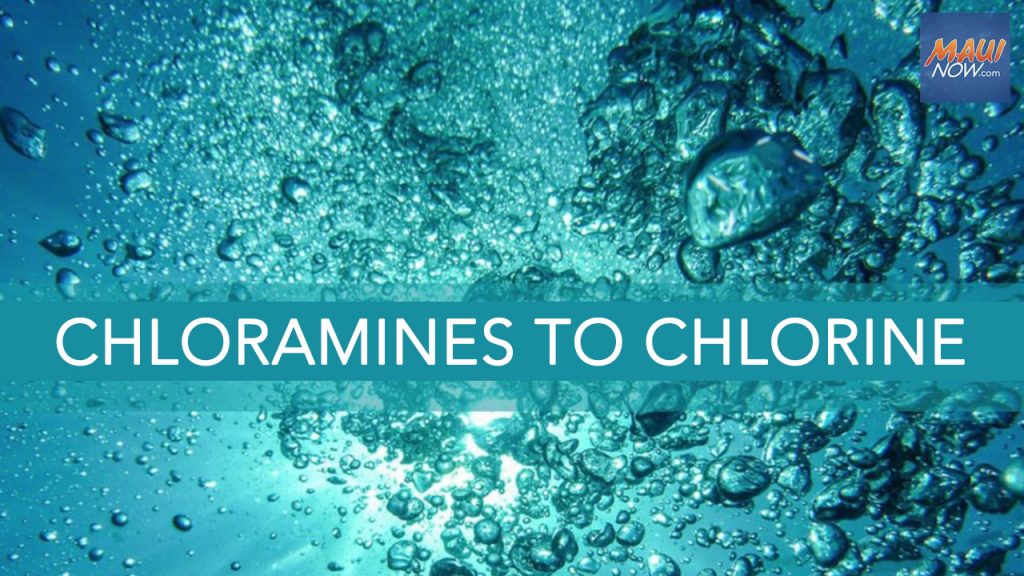Upper Kula water now disinfected with chlorine

The Department of Water Supply changed its water distribution disinfectant from chloramines to chlorine in an attempt to clear away the last trace amounts of total coliform bacteria and E. coli from the Upper Kula water system. The change went into effect on Monday, Jan. 10, 2022.
For the chlorine to reach the furthest points of the water system, it may take up to seven days. Chlorine is already used as a disinfectant in the Lower Kula and Makawao water systems. Upcountry customers in Olinda, Lower Kula and Makawao are not affected.
“The department’s ongoing efforts to rid the Upper Kula system of trace amounts of E. coli have included flushing the system, cleaning lines and water sampling sites, clearing/replacing pressure-reducing valves, standpipes and fire hydrants and collecting water samples for testing. Although progress has been made, E. coli remains in the system,” county officials said in a press release.
Boil Water Advisory continues for certain areas:
The Department of Water Supply continues to recommend boiling tap water as a precaution for residents of Lepelepe Place, Malamahale Place, Malia Uli Place, Waipoli Road, Naʻalae Road, Kawehi Place, Polipoli Road and Lower Kula Road between Naʻalae and Waipoli roads.
Affected residents are advised to use bottled water or bring water for consumption to a boil and let it boil for a minute. Let it cool before using. Boiled or bottled water should be used for drinking, making ice, brushing teeth, washing dishes, and food preparation until further notice. Boiling kills bacteria and other organisms possibly in the water.
Potable water tankers remain in the following areas: Fong Store, Ching Store, ʻUlupalakua Ranch Office, Kula Community Center, Rice Park and Copp Road at Kula Highway.
The boil water advisory will continue until repeated daily water sample testing shows that tap water meets public health standards. Despite ongoing waterline maintenance and flushing since mid-December of 2021, lab test results continue to show trace amounts of E. coli bacteria in affected areas.
How chlorine could impact customers
The Water Department is also asking affected residents to assist ongoing disinfection efforts by flushing their water fixtures, cleaning faucet aerators, water heater tanks and any water filters in and around their homes during the week of Jan. 17-23, 2022. This should help move chlorinated water through household fixtures. The department anticipates using chlorine at least through January, 2022, and will provide updates as soon as they are available.
When the switch to chlorine is done, customers might notice a chlorine taste and smell to the water. This is normal. Boiling water will accelerate chlorine dissipation and should reduce any chlorine smell or taste.
For kidney dialysis patients: The processes already in place to remove chloramines in the water will remove chlorine. If you have been advised to boil your water, please continue to do so.
For fish tank owners: If you have a filter that removes chloramines, no change or adjustment is needed. For fish tanks without filters, you may want to let the water sit for a few hours before adding it to your fish tank so the chlorine can dissipate. If you have been advised to boil your water, please continue to do so.
More information
The department has posted maps of boil water areas, answers to frequently asked questions, and other updates on its website at https://www.mauicounty.gov/126/Department-of-Water-Supply.
Questions about water quality can be directed to the DWS Laboratory at 808-270-7550, or go to www.mauicounty.gov/water. Adam Mundy is also available during regular working hours at 808-270-8046; and the Water Supply 24-hour service line is also available at 808-270-7633 for water service problems.










